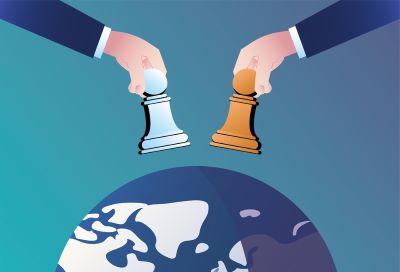Context:
In the week's geopolitical landscape, three significant summits unfold, each bearing witness to the evolving contours of global politics in 2024. Davos, Switzerland, hosts the world's elite, while Kampala, Uganda, becomes the backdrop for the Non-Aligned Movement (NAM) and the G77 summits, representing the underprivileged. Shared among these gatherings is the challenge of navigating structural changes in the international system, rendering the old mantras of globalism and collectivism increasingly obsolete.
|
About Non-Aligned Movement The Non-Aligned Movement (NAM) is a coalition of 120 developing world states that have chosen not to align formally with any major power bloc. Established in 1961, the NAM aims to forge an autonomous path in global politics, enabling member states to maintain independence and avoid becoming pawns in the power struggles between major nations. |
The Unraveling of Davos Man's Worldview:
The term 'Davos Man' represents the global elite that has held significant influence since the 1990s. After the fall of the Berlin Wall in 1989 and the dissolution of the Soviet Union in 1991, a period of relative stability, led by the United States, unfolded. The economic landscape saw the emergence of the Washington Consensus, advocating for the unrestricted movement of capital, goods, services, and labor across international borders. Nevertheless, the current era of prosperity and global integration is encountering challenges.
Renewed great power conflict, exemplified by the war in Ukraine, has shattered the illusion of a stable world order. The rise of China, coupled with the alliance between China and Russia, poses the most significant challenge since World War II. East Asia simmers with tension, and conflicts in the Middle East add to the complexities. The Davos Man's worldview, rooted in globalism and efficiency, is under siege, exacerbated by the "greenlash" against climate change initiatives and growing nationalist sentiments.
The Trump Era and Its Impact:
The election of Donald Trump in 2016 marked a decisive shift away from the Davos agenda. Trump capitalized on anti-globalization sentiments, criticizing free trade, China's economic tactics, global institutions, immigration, and climate activism. Although Joe Biden's 2020 election did not entirely reverse this agenda, it showcased a nuanced approach. Biden aimed to rework the global economic order, emphasizing industrial policies, worker interests, and supply chain resilience. As Trump eyes reelection, promising a return to nationalism, Davos must grapple with a changing world that diverges from its traditional agenda.
Challenges for NAM and G77:
The Non-Aligned Movement and the G77, representing the Global South, face their own set of challenges. Despite renewed political enthusiasm for the Global South, practical outcomes for these institutions, known for proclaiming solidarity and collective bargaining, remain elusive. The rise of regionalism across the Global South, exemplified by entities like ASEAN and the African Union, has diminished the influence of NAM and G77. BRICS, with Russia blurring the traditional North-South framework, has absorbed some of their agendas, wielding greater political impact.
China's Strategic Initiatives:
China, never part of NAM or G77, actively engages with both forums. As the world's second-largest economy and a challenger to the US-led world order, China positions itself as the Global South's champion. Initiatives like the Belt and Road Initiative (BRI) reflect Beijing's determination to reshape the global order on Chinese terms. India, emphasizing its role in the Global South, aims to reclaim traditional positions in NAM and G77.
India and China at Crossroads:
Both China and India must adapt to structural shifts in the global order while seeking influence in the Global South. Major countries in the Global South now have leverage in the renewed great power contest, allowing negotiations for elite or national benefits. China, represented at both Davos and Kampala, aspires to revise the global economic order. In contrast, India focuses on integration and reform, positioning itself as a bridge between the North and the South.
Conclusion:
The dynamics of global politics in 2024 unfold against a backdrop of seismic shifts. The Davos Man's worldview, rooted in globalism and efficiency, faces challenges from renewed great power conflicts and nationalist sentiments. NAM and G77 grapple with the need for tangible outcomes amid the rise of regionalism and the overshadowing influence of entities like BRICS. China and India navigate the changing global order, each with distinct objectives – China seeking to reshape the order on its terms, while India emphasizes integration and reform. As the world witnesses a complex interplay of forces, these summits underscore the imperative for a nuanced understanding of the multifaceted challenges and opportunities shaping our global landscape.
|
Probable Questions for UPSC Mains Exam
|
Source – Indian Express







